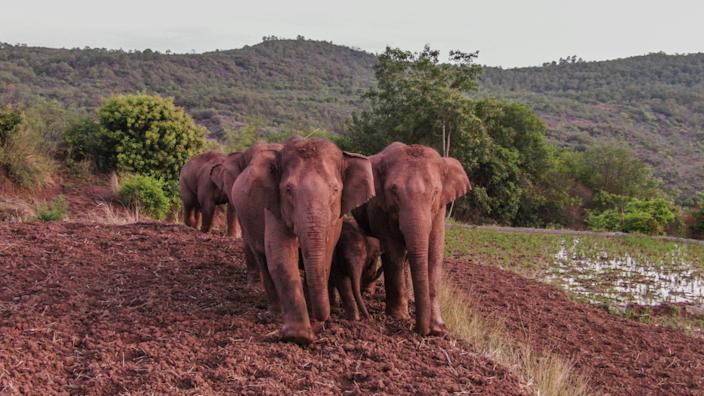A herd of 15 elephants have left their home last March 2020 at Xishuangbanna National Nature Reserve in southwest Yunnan at the border with (strife-torn) Myanmar and Laos and was last seen on June 2 traipsing through a neighborhood near the Shuanghe Township, in southwestern China's Yunnan Province, last week. While news of their migration has spread across China and gone viral online, with many expressing wonder and fascination, experts warned that this rare journey could indicate the inevitable and damaging consequences of human encroachment on the elephants’ natural habitat.
Their 300- mile migratory route was monitored by hundreds of police officers assisted by drones, which had captured the hearts of million in social media who found the mammoth (11 feet tall weighing 11,000 pounds each) wild animals cute and loveable.
Online sensation
While news of their migration has spread across China and gone viral online, with many expressing wonder and fascination, experts warned that this rare journey could indicate the inevitable and damaging consequences of human encroachment on the elephants’ natural habitat.
Adam Chang was hired to deliver corn and pineapples to the elephants, who was amazed at the animals.
“I saw them picking apart the corn with their trunks,” he told NBC News over the messaging and social media app WeChat.
More lively
“They are just so much more lively than those I saw in the zoo. It almost felt as if they had a holy aura around them,” he said.
The herd reached Kunming on June 2, despite efforts from police to lure them back home. The animals took their time crossing what would have been busy thoroughfares, eating and stumbling into irrigation ditches before going to sleep in woods nearby.
After trending on social media in late May, many netizens were awestruck, while some complained about the destruction left in their wake.
Holy animals
But Jason Cao, owner of a Yunnan mining company contracted by the government to deliver their feed, said he did not think the damage they caused was serious.
“Elephants are holy animals that can bring fortune and peace in Chinese culture, so we are very happy the elephants came,” he said.
Both Chang and Cao declined to give their first names for fear of retribution by Chinese officials. Instead, they asked to be identified with their "American" names.
The herd first came to the attention of outsiders in March 2020 when they left their home in the Xishuangbanna National Nature Reserve in southwest Yunnan.
A calf was born in November and two elephants split off from the rest in April 2021, according to the state news agency Xinhua.
Officials and experts say they do not know why the herd is migrating.
Recommended
According to Tammie Matson, zoologist and research fellow at the University of Rwanda and director of Matson and Ridley Safaris, elephants can travel long distances if there isn’t enough habitat to meet their needs.
“Some may be driven to move away to get access to these resources to avoid competition,” she said.
Xinhua has reported that the Asian elephant population in Yunnan has ballooned from 180 in the 1980s to 300 in 2021.
So, it is possible that as numbers grew, a subgroup began searching for new habitat, got lost and just kept traveling, according to Nilanga Jayasinghe, manager of the wildlife conservation team at WWF, an international nongovernmental organization that specializes in wildlife preservation.
Human activities
Netizens have plenty of theories as to why the elephants are migrating, blaming global warming and deforestation.
Asian elephants inhabit forests and grassland, so deforestation rates in Xishuangbanna, which reached an annual average of 4.1 square miles in 2010, may have contributed to the herd’s migration.
Still, long-distance treks are not unknown for the animals, according to Raman Sukumar, professor of ecology at the Indian Institute of Science in Bengaluru, India, with similar migrations having happened in India and Sri Lanka.
These trips can have a negative impact on a herd’s health, he warned.
“I would expect that the stress levels in the elephants would start going up because the elephants are in a totally different kind of terrain,” he said. “It is very densely populated ... It's not so easy for them to navigate through a city.”
For Hannah Mumby, assistant professor at the University of Hong Kong’s School of Biological Sciences, it is important to address the root cause of their departure, otherwise this behavior could be repeated.
Second herd
The China Central Television News Agency has captured signs of a second herd of elephants attempting to migrate across a river in Xishuangbanna.
In the meantime, those who have seen the elephants say the experience is more than memorable.
“Before this encounter I just felt curious about animals, now I think I would volunteer in animal rights groups to preserve those giant creatures,” Chang said.
Tags: #elephantherd, #China, #humansversuswildlife
